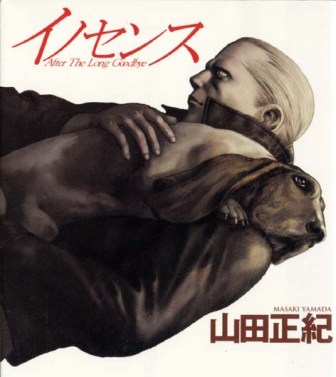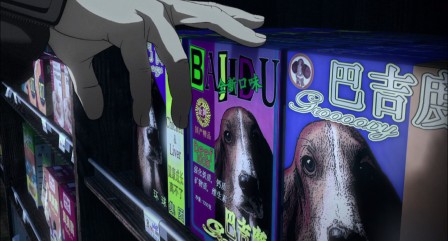February 3rd, 2011
AFTER THE LONG GOODBYE
 A few years ago, I had mapped out rough drafts of reviews for Ghost in the Shell, Ghost in the Shell 2: Innocence, and Ghost in the Shell: S.A.C. Solid State Society with the intention of possibly even tackling a critique of the first season of Ghost in the Shell: Stand Alone Complex. Unfortunately, I didn’t back any of those files up, so those reviews died along with my Compaq’s hard drive. Someday, I hope to revisit at least one of those films and maybe even write a review, but until that day, perhaps I can at least “atone” for their disappearance with this mini-review of Masaki Yamada’s After the Long Goodbye, a literary prequel of sorts to Ghost in the Shell 2: Innocence.
A few years ago, I had mapped out rough drafts of reviews for Ghost in the Shell, Ghost in the Shell 2: Innocence, and Ghost in the Shell: S.A.C. Solid State Society with the intention of possibly even tackling a critique of the first season of Ghost in the Shell: Stand Alone Complex. Unfortunately, I didn’t back any of those files up, so those reviews died along with my Compaq’s hard drive. Someday, I hope to revisit at least one of those films and maybe even write a review, but until that day, perhaps I can at least “atone” for their disappearance with this mini-review of Masaki Yamada’s After the Long Goodbye, a literary prequel of sorts to Ghost in the Shell 2: Innocence.
Perhaps in a bid to stave off a nervous breakdown, I’ve been trying to read things from my collection that have nothing to do with my dissertation. After all, it’s about time I catch up on the many, many books that adorn my shelves, but have yet to be cracked open. One such book is the aforementioned After the Long Goodbye, which was purchased at the height of my interest in the popular Ghost in the Shell franchise.
First published in Japan in 2004 and later translated by Yuji Oniki and Carl Gustav Horn for publication by Viz Media in 2005, the novel takes place shortly before the events of GITS 2: Innocence, and is told from the perspective of Batou, the primary male character in the Ghost in the Shell franchise. A soulful cyborg working for the counter-terrorist task force known as Section 9, Batou still carries a torch for Major Motoko Kusanagi, his female superior officer and, as I interpret it, his unrequited love. I would explain what happened to Motoko in the first movie, but I don’t have all day.
Crossing cyberpunk with noir, the novel takes its title from Raymond Chandler’s penultimate Philip Marlowe detective novel, The Long Goodbye (1953), although the book’s premise is actually a tribute/total rip-off of Robert Altman’s 1973 film adaptation of the same name, which makes substantial alterations to the source text. The initial chapters of Yamada’s novel deal with Batou’s quest to buy the perfect dog food for his basset hound, Gabriel (aka Gabu), only to lose the dog under mysterious circumstances. This is exactly what happens to Marlowe’s cat in the Altman film, although Masaki Yamada at least makes the dog’s disappearance integral to the plot. Amidst this search for his canine companion, Batou must face-off against violent cyber-terrorists, a nefarious kingpin named Cherry Lin (no, really!), and a cybernetic Chairman Mao (more on that later). What do all these figures have to do with Gabu’s dog-knapping? And why does Batou keep dreaming about a son he’s never had?

Still from Ghost in the Shell 2: Innocence
Yamada, it seems to me, seems less committed to the missing dog/cyber-terrorism/triad kingpin plot than you might expect, as all those elements occasionally come across as plot contrivances to allow the author to muse on serious questions about ethics and existence: what is a soul? Do dogs have souls? What about cyborgs? Think Philosophy 101 as filtered through Blade Runner and The Matrix. Don’t get me wrong; I’m only poking fun. In truth, the philosophical aspects of the novel trump the action, as Yamada renders it an half-baked, largely confusing way that can’t compare to the explosive punch of the novel’s anime counterparts. Otherwise, After the Long Goodbye successfully mixes science fact with science fiction (with a good heaping of existentialism thrown in) to ask some serious questions about life in our own technology-driven era. It’s interesting, but doesn’t necessarily make for a compelling story.
Oh, and there’s also some Simon & Garfunkel — although Paul and Art don’t literally appear, their lyrics do, specifically some lines culled from “The Sound of Silence,” which are used as chapter titles: Chapter 1: “Hello, Darkness,” Chapter 2: “Split the Night,’ Chapter 3: “And Touched the Sound of Silence,” Chapter 3: Neon God They Made,” and Chapter 4: “Take my Arms.” I’m wondering if Yamada wants us to play it in the background for mood music.
Anyway, let’s leave The Graduate soundtrack aside and return to that cybernetic Chairman Mao. For me, the single most enjoyable part of the novel is Yamada’s riff on fast food culture and the cult of personality surrounding Mao Zedong. In Yamada’s world, those two are on an inevitable collision course, as Batou runs into “Mao Mantou,” one of many androids made to look like the deceased communist leader. In this version of the future, Chairman Mao has eclipsed Col. Sanders as the most beloved fast food icon in the East, becoming “a registered trademark of the beef buns that bears his name” (94). Apparently, Mao Mantou company has poached the familiar golden arches (M) of McDonald’s as Ronald McDonald himself “lost his job to Chinese outsourcing” (95). It seems even in death, Mao has found a way to “serve the people” — well, serve them steam buns anyway.
Despite my measured enthusiasm for the book, I have a suspicion that After the Long Goodbye will only really make an impression on Ghost in the Shell devotees, and even then, your mileage will vary. A few token appearances by series stalwarts Aramaki and Togusa enliven the proceedings for those readers who happen to know who the hell they are, but without the Major, it’s not quite Ghost in the Shell, is it? Still, newbies who have a soft spot for hardboiled detective stories, cyberpunk thrillers, or existential philosophy might find the book suitably enjoyable.
As a bonus, Viz included an interview with Yamada and Ghost in the Shell director Mamoru Oshii is definitely worth reading and provides insights into both the writing and filmmaking process.
Grade: B


February 3rd, 2011 at 11:45 pm
The Elliot Gould version of The Long Goodbye? Ugh, that’s the worst adaptation of a Chandler work ever. Personally, I prefer Playback, but that’s just me.
GITS was the first anime I ever actually enjoyed watching, although I was never sure what exactly was going on.
February 5th, 2011 at 12:50 pm
I also remember having trouble making heads or tails of what was happening in GITS the first time around. Personally, I prefer the animated series, but the visuals in INNOCENCE are hard to top.